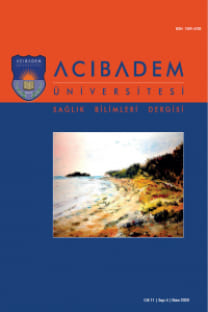Gebelerde Huzursuz Bacak Sendromunun Uyku Kalitesi ve Kaygı Düzeyi Üzerine Etkisi
The Effect of Restless Leg Syndrome in Pregnant Women on Sleep Quality and Anxiety Level
Restless leg, pregnant woman, nurse sleep,
___
- 1. Bilgilisoy Filiz M, Çakır T. Güncel tanı kriterleri ile huzursuz bacak sendromu. Turk J Osteoporos 2015;21:87–95. [CrossRef]
- 2. Liu G, Li L, Zhang J, Xue R, Zhao X, Zhu K, et al. Restless legs syndrome and pregnancy or delivery complications in China: a representative survey. Sleep Med 2016;17:158–62. [CrossRef]
- 3. Yüksel B, Seven A, Yıldız YK, Kucur S, Gözükara İ, Polat M, et al. Gebelikte huzursuz bacak sendromu. JGON 2015;12:144–6.
- 4. Sarberg M, Josefsson A, Wiréhn AB, Svanborg E. Restless legs syndrome during and after pregnancy and its relation to snoring. Acta Obstet Gynecol Scand 2012;91:850–5. [CrossRef]
- 5. Patrick L. Restless legs syndrome: pathophysiology and the role of iron and folate. Altern Med Rev 2007;12:101–12. http://archive. foundationalmedicinereview.com/publications/12/2/101.pdf
- 6. Çelik F, Köse M. Gebelikte uyku kalitesinin trimester ile ilişkisi. Kocatepe Tıp Derg 2017;18:85–8. [CrossRef]
- 7. Akbaş P. Gebelerde huzursuz bacak sendromu sıklığı ve yaşam kalitesi üzerine etkisinin değerlendirilmesi, Gazi Üniversitesi, Sağlık Bilimleri Enstitüsü, Hemşirelik Anabilim Dalı Yüksek Lisans Tezi, Ankara, 2017. s.37–59.
- 8. Tunç T, Karadağ YS, Doğulu F, İnan LE. Predisposing factors of restless legs syndrome in pregnancy. Mov Disord 2007;22:627–31. [CrossRef]
- 9. Sönmez A. Huzursuz bacak sendromu olan gebelere verilen uyku hijyeni eğitiminin uyku kalitesine etkisi. İnönü Üniversitesi Sağlık Bilimleri Enstitüsü, Ebelik Anabilim Dalı Yüksek Lisans Tezi, Malatya, 2017. s.23–33.
- 10. Chang JJ, Pien GW, Duntley SP, Macones, GA. Sleep deprivation during pregnancy and maternal and fetal outcomes: is there a relationship? Sleep Med Rev 2010;14:107–14. [CrossRef]
- 11. Ertekin Pınar Ş, Arslan Ş, Polat K, Çiftçi D, Cesur B, Dağlar G. Gebelerde uyku kalitesi ile algılanan stres arasındaki ilişkinin incelenmesi. DEUYHOEDERGİ 2014;7:171–7. http://www.deuhyoedergi.org/ index.php/DEUHYOED/article/view/95/346
- 12. Palagini L, Gemignani A, Banti S, Manconi M, Mauri M, Riemann D. Chronic sleep loss during pregnancy as a determinant of stress: impact on pregnancy outcome. Sleep Med 2014;15:853–9. [CrossRef]
- 13. Polo‐Kantola P, Aukia L, Karlsson H, Paavonen E. Sleep quality during pregnancy: associations with depressive and anxiety symptoms. Acta Obstet Gynecol Scand 2017;96:198–206. [CrossRef]
- 14. Volkovich E, Tikotzky L, Manber R. Objective and subjective sleep during pregnancy: links with depressive and anxiety symptoms. Arch Womens Ment Health 2016;19:173–81. [CrossRef]
- 15. Soper DS. A-priori sample size calculator for multiple regression [Software]. http://www.danielsoper.com/statcalc
- 16. Cohen J, Cohen P, West SG, Aiken LS. Applied Multiple Regression/ Correlation Analysis for the Behavioral Sciences, 3rd ed. Mahwah, NJ: Lawrence Earlbaum Associates; 2014.
- 17. Walters AS, LeBrocq C, Dhar A, Hening W, Rosen R, Allen RP, et al. Validation of the International Restless legs Syndrome Study Group rating scale for restless legs syndrome. Sleep Med 2003;4:121–32. [CrossRef]
- 18. Sevim S, Dogu O, Camdeviren H, Bugdayci R, Sasmaz T, Kaleagasi H, et al. Unexpectedly low prevalence and unusual characteristics of RLS in Mersin, Turkey. Neurology 2003;61:1562–9. [CrossRef]
- 19. Hening WA, Allen RP. Restless legs syndrome (RLS): the continuing development of diagnostic standards and severity measures. Sleep Med 2003;4:95–7. [CrossRef]
- 20. Buysse DJ, Reynolds CF 3rd, Monk TH, Berman SR, Kupfer DJ. The Pittsburgh Sleep Qualityal. Index: a new instrument for psychiatric practice and research. Psychiatry Res 1989;28:193–213. [CrossRef]
- 21. Ağargün MY, Kara H, Anlar Ö. Pittsburgh uyku kalitesi indeksinin geçerliği ve güvenirliği. Turk Psikiyatri Derg 1996;7:107–15.
- 22. Sevinç S, Özdemir S. Hemşirelik öğrencilerinin kaygı ve umutsuzluk ilişkisi: Kilis örneği. HEMAR-G 2017;19:14–24. http://hemarge.org.tr/ ckfinder/userfiles/files/2017/vol19sayi2/(2).pdf
- 23. Öner N, Le Compte A. Durumluk-sürekli kaygı envanteri el kitabı. İstanbul: Boğaziçi Üniversitesi Yayını, 1998.
- 24. Köybaşı EŞ, Oskay ÜY. Gebelik sürecinin uyku kalitesine etkisi. Gülhane Tıp Derg 2017;59:1–5.
- 25. Mindell JA, Cook RA, Nikolovski J. Sleep patterns and sleep disturbances across pregnancy. Sleep Med 2015;16:483–8. [CrossRef]
- 26. Yang Y, Mao J, Ye Z, Li J, Zhao H, Liu Y, Li J. Determinants of sleep quality among pregnant women in China: a cross-sectional survey. J Matern Fetal Med 2018;31:2980–5. [CrossRef]
- 27. Antony KM, Agrawal A, Arndt ME, Murphy AM, Alapat PM, Guntupalli KK, Aagaard KM. Association of adverse perinatal outcomes with screening measures of obstructive sleep apnea. J Perinatol 2014;34:441–8. [CrossRef]
- 28. Ding XX, Wu YL, Xu SJ, Zhang SF, Jia XM, Zhu RP, et al. A systematic review and quantitative assessment of sleep-disordered breathing during pregnancy and perinatal outcomes. Sleep Breath 2014;18:703–13. [CrossRef]
- 29. Chen PH, Liou KC, Chen CP, Cheng SJ. Risk factors and prevalence rate of restless legs syndrome among pregnant women in Taiwan. Sleep Med 2012;13:1153–7. [CrossRef]
- 30. Hensley JG. Leg cramps and restless legs syndrome during pregnancy. J Midwifery and Womens Health 2009;54:211–8. [CrossRef]
- 31. Schuurmans C, Kurrasch DM. Neurodevelopmental consequences of maternal distress: what do we really know? Clin Genet 2013;83:108– 17. [CrossRef]
- 32. Yali M, Lobel M. Stress-resistance resources and coping in pregnancy. Anxiety Stress Coping 2009;15:289–309. [CrossRef]
- 33. Alvaro PK, Roberts RM, Harris JK. A systematic review assessing bidirectionality between sleep disturbances, anxiety, and depression. Sleep 2013;36:1059–68. [CrossRef]
- ISSN: 1309-470X
- Yayın Aralığı: 4
- Başlangıç: 2010
- Yayıncı: ACIBADEM MEHMET ALİ AYDINLAR ÜNİVERSİTESİ
Gebelerde Huzursuz Bacak Sendromunun Uyku Kalitesi ve Kaygı Düzeyi Üzerine Etkisi
Antiviral Kullanımına Bağlı Gelişen Femoral Nöropati: Olgu Sunumu
Burcu ÖNDER, Fatih Oğuz ÖNDER, Betül YAVUZ KELEŞ
D Vitamini Eksikliği Direkt İnguinal Herni Oluşmasına Neden Olur Mu? Ön Sonuçlar
Mehmet Eren YÜKSEL, Funda TAMER, Emine AVCI
Öğretmenlerin Sigara İçme Konusunda Tutum ve Düşüncelerinin Değerlendirilmesi: Kesitsel Bir Çalışma
Serap YÜCEL, Sedenay Oskeroğlu KAPLAN, Zeynep GÜRAL, Ayşin KAYIŞ, Fethullah IŞIK, Fulya AĞAOĞLU
Psikiyatride Optik Koherens Tomografi Kullanımında Multidisipliner Yaklaşımların Önemi
Üsküdar İlçesi Anaokulu Menülerinin Değerlendirilmesi
Elvan YILMAZ AKYÜZ, Esin SEZGİN
Gebelerin Perspektifinden, Kadın Sağlığı ve Hastalıkları Hemşireliği’nde, Erkek Öğrencilere Bakış
